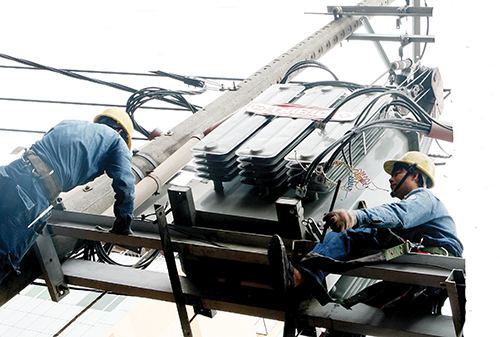Power security calls for new plan

Delays to power plants cause fears over power security
In a document just released by the Government Office, seen by VIR, Deputy Prime Minister Hoang Trung Hai ordered the Ministry of Industry and Trade (MoIT) to “urgently complete the adjusted electricity master plan VII” to be submitted for prime ministerial approval next year.
Hai also asked MoIT to hire an experienced foreign consultant to advise on amendments to the master plan VII.
The electricity master plan VII, or the national electricity development master plan for the 2011-2020 period, was released two years ago and comprised of construction timelines for 86 power generation projects and the national power transmission grid.
The plan was designed to ensure national power security in the long term. However, the implementation of this plan has been slow over the past two years, raising great concerns over potential power shortages in the near future.
“The construction of many power projects, particularly those in the south, have been delayed, requiring additional supply from the north and central regions to be sent to the south. This threatens the supply security of the national power system,” Hai said in the Government Office’s document.
According to the document, the government has taken numerous measures to push the development of power projects in the south, including Vinh Tan 2, Duyen Hai 1 and Duyen Hai 2 power plants, and setting up transmission lines between Pleiku – My Phuoc – Cau Bong, and Dak Nong – Phuong Long – Binh Long. But these are not likely to be enough to ease the threat of power shortages.
“If no more measures are implemented to increase the construction of power plants and transmission lines, a severe power shortage is forecast in the south from 2014-2015,” Hai said.
According to the electricity master plan VII, signed by Prime Minister Nguyen Tan Dung on July 21, 2011, 46 out of 86 electricity generating projects were assigned to state-owned companies, of which Electricity of Vietnam (EVN), PetroVietnam and mining group Vinacomin are the investors of 40 projects.
Fourteen projects were assigned to private domestic investors. Meanwhile, foreign independent power producers, who are said to have stronger financial capital, have few opportunities to engage in the plan, being assigned only eight projects.
Just a few months after the government released the master plan VII, state-owned groups and corporations like EVN, PetroVietnam and Vinacomin complained that they could not procure the necessary funds for all the power investment projects.
From now to 2015, EVN needs at least $25.3 billion for developing new power generators and transmission projects and PetroVietnam needs $8 billion to build five thermal power projects. Meanwhile, Vinacomin needs about $1.6 billion each year for investment in the sector.
Although Vietnam’s economy is experiencing a downturn, power demand in the first half of the year still rose 11 per cent year-on-year. The MoIT estimates power demand will keep on rising from 11 per cent to 13 per cent next year, burdening the existing power supply if new power generating plants fail to meet construction schedules.
What the stars mean:
★ Poor ★ ★ Promising ★★★ Good ★★★★ Very good ★★★★★ Exceptional
Latest News
More News
- Hermes joins Long Thanh cargo terminal development (February 04, 2026 | 15:59)
- SCG enhances production and distribution in Vietnam (February 04, 2026 | 08:00)
- UNIVACCO strengthens Asia expansion with Vietnam facility (February 03, 2026 | 08:00)
- Cai Mep Ha Port project wins approval with $1.95bn investment (February 02, 2026 | 16:17)
- Repositioning Vietnam in Asia’s manufacturing race (February 02, 2026 | 16:00)
- Manufacturing growth remains solid in early 2026 (February 02, 2026 | 15:28)
- Navigating venture capital trends across the continent (February 02, 2026 | 14:00)
- Motivations to achieve high growth (February 02, 2026 | 11:00)
- Capacity and regulations among British areas of expertise in IFCs (February 02, 2026 | 09:09)
- Transition underway in German investment across Vietnam (February 02, 2026 | 08:00)
















 Mobile Version
Mobile Version